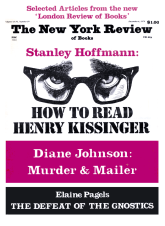In response to:
The Cold War Revisited from the October 25, 1979 issue
To the Editors:
Mr. Arthur Schlesinger, Jr., in his review of several books on the Cold War in your October 25th issue, refers to my book The Rivals, where according to him I argue “not that diplomacy could have averted the Cold War,” but that “tougher Western diplomacy, i.e., fighting the Cold War earlier—might have held the Russians back.” My argument is in fact quite different.
I do not believe that “tougher Western diplomacy” would have meant “fighting the Cold War earlier.” On the contrary, the view I advanced was that it would have avoided some of its worst and most dangerous battles and side effects. Granted the very nature of the post-war world made it unlikely that the two superpowers could have remained friends. Yet it was the very supineness of American diplomacy in the face of the Soviet Union’s violations of its wartime pledges which served to aggravate the tension, tended to make the Soviets overcommit themselves to a hostile posture vis-à-vis the West, which in turn was bound to make the US overreact, and thus a vicious circle, with such domestic side effects as McCarthyism. Mr. Schlesinger himself comes close to this view when he quotes approvingly a foreign observer who stated that “it was not the American government…but the mass of ordinary people who first became angry over Soviet actions and then turned the Truman administration around.” As I wrote elsewhere, “We have overlooked those occasions where tenacious well-informed diplomacy could have made a difference, and where hard bargaining, rather than posturing, might have brought partial solutions and lowered the international tension.” This, alas, remains as true today as it was in the 1940s.
Adam B. Ulam
Gurney Professor of History and Political Science
Harvard University
Cambridge, Massachusetts
Jr. Arthur Schlesinger replies:
Mr. Ulam overreacts to the phrase “fighting the Cold War earlier.” I meant by that phrase no more than the policy implied by his own indictment of the “supineness of American diplomacy in the face of the Soviet Union’s violations of its wartime pledges.”
Whether the harder line recommended by Mr. Ulam would in fact have lowered rather than heightened the international tension is a matter about which I am a good deal less sure than he is. Given the stakes involved and the wide range of possible Soviet reactions, how can Mr. Ulam, astute an analyst as he of course is, be so absolutely certain that his policy would have been incontrovertibly right and that Winston Churchill and Franklin Roosevelt, making choices under the burden of responsibility, were self-evidently and hopelessly wrong?
This Issue
December 6, 1979



